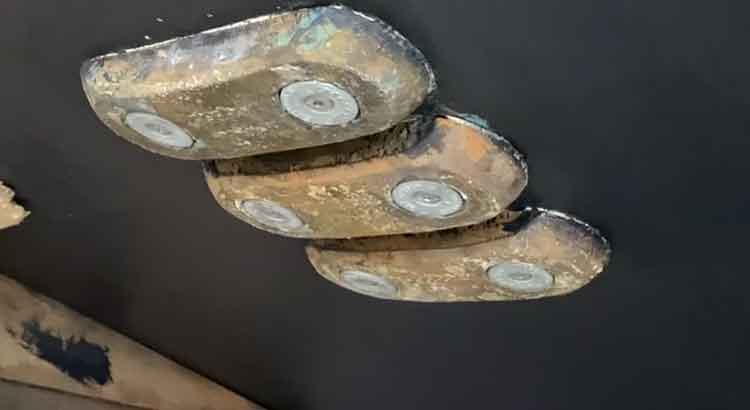Boat anodes are also known as sacrificial anodes, and they are used to save the hull of a boat from galvanic corrosion.
Pontoon boats are designed for freshwater, where an anode is not needed since the danger of rust is not that great. But if you want to take your pontoon boat in the ocean, or in a salt lake, where the risk of rust is greater, you will need to use a sacrificial anode.
Pontoon boats don’t need anodes in freshwater, but if you use them in saltwater you will need to attach sacrificial anodes to your pontoon.
Adding an anode to your boat is not too hard, the hard part is to know which one to choose. There are multiple types of anodes on the market, there are aluminium anodes, zinc anodes and magnesium anodes, and each one of them has it;s own advantages and disadvantages.
There is no “best” anode, it’s mostly up to you to choose which one you want to use. So, in order to properly understand which one of them is the right choice for you, we should first discuss the galvanization process that is responsible for the rust.
Table of Contents
The Galvanization Process
Galvanic corrosion occurs when two different metals or alloys with different electrochemical potentials come into contact, while they are underwater.
When this happens the metal with a lower electrochemical potential will act as an anode, and the one with a higher electrochemical potential will act as a cathode. Between the two of them the one with the lower electrochemical, the anode, will corrode.
Here is a chart with different metals and their average electrochemical potential in water:
As you all the three possible anode choices: aluminium, zinc and magnesium are in the lower part of the chart, and all of them with the exception of the aluminium, are under the aluminium.
Two factors that influence how fast the corrosion will take place are the electrochemical potential, as well as the difference in surface between the two metals.
Aluminium is an alloy, so it’s made by combining multiple elements, so depending on the quantity of each element, it will have a different electrochemical property. So one piece of aluminium can still act as an anode for another piece of aluminium, as long as it has a lower electrochemical property.
Two factors that influence how fast the corrosion will take place are the electrochemical potential, as well as the difference in surface between the two metals.
If for example the tubes of the pontoon were made out of titanium, we could have used other types of metal as anodes, since titanium has one of the highest electrochemical properties. The basic principle when you are choosing a sacrificial anode is that the anode must be of a lower electrochemical value (also known as the nobility of the metal), than the metal that it’s trying to protect.
Another thing to keep in mind is that corrosion can also occur in different parts of the same metal. For example we use a screw, and we keep it half in water, the part that is in water will act as an anode, while the part that is not in water will act as a cathode. So the part in the water will rust while the other part won’t.
Water is an extremely conductive material, and as we all know electricity can travel extremely fast through water. Galvanic corrosion happens when two different types of metal are in the same environment. Most large body water is full of metal, whether we are talking of other boats or metal deposits at the bottom.
Aluminium, out of which pontoon boats tubes are made, is normally resistant to rust, but in this environment it’s very susceptible to it, due to its composure.
Now that we know how the corrosion takes place, and how the cathodes protect the pontoon, let’s talk about the different choices that we have,aluminium anodes, zinc anodes, and magnesium anodes.
Aluminium Anodes
At the moment aluminium anodes are the most used anodes on the market.
As we discussed earlier the aluminium anode has to be of a lower nobility that the one used for the tubes, otherwise it won’t be able to do its job.
The technology used to make the aluminium anodes was developed by the US Navy, and at the moment they are also using aluminium anodes for their ships. But they are not the only ones to use those types of anodes, most commercial ships, and cruise ships also use those types of anodes.
Zinc Anodes
Before the innovation of the aluminium, zinc anodes were the most popular choice.
Overall zinc anodes are not as efficient as the aluminium anodes. Their popularity was largely due to the availability of the zinc, and the cheap price, not necessarily to the efficiency. Not to say that the zinc anodes were not efficient, but their efficiency was nothing spectacular.
Another major reason why zinc anodes are not as popular as they used to be is due to their high toxicity, which greatly affected the environment.
But, overall zinc anodes are still a viable option for pontoon boats, they will still protect your boat from rust, and the toxicity which harmed the environment is negligible in this case, it was mostly a problem for the huge vessels
Magnesium Anodes
Magnesium anodes have the lowest electrochemical value out of all the three options. And this makes them the most efficient anode.
Magnesium anodes are also very environmentally friendly, since magnesium is a non toxic metal.
The big disadvantage of magnesium anodes is that they rust extremely fast compared to the rest.
Clean Your Pontoon With Freshwater
One extra thing that you can do to protect your boat from rust is to wash off all the salt of the boat.
After you get out of the ocean, or the salt lake make sure to properly wash your pontoon with freshwater. Even if salt by itself won’t cause your pontoon to rust, it will greatly amplify the process. So leaving any salt on the boat is a really bad idea.
Final Thoughts
So, a pontoon needs a sacrificial anode, especially in salt water.
While anodes are not required in freshwater, it’s still recommended to use one as corrosion can still happen, even if it’s going to happen at a considerably slower rate.
Now you know everything that there is about anodes. As you can see there are advantages and disadvantages to each one, so the choice is up to you. I personally use aluminium anodes, if they are good for the US Navy they are also good for my pontoon boat. But each one of the three is a viable option,

